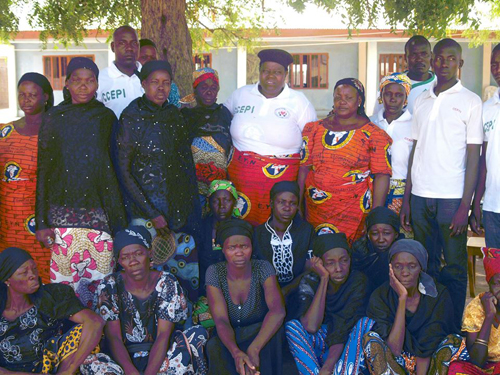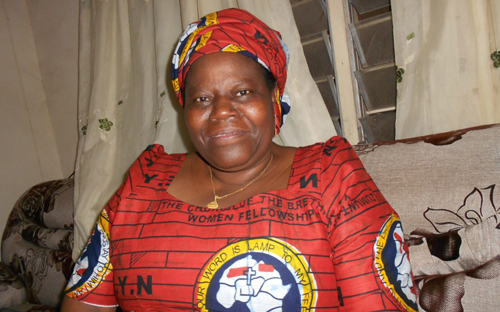
The recipient of this year’s UN Sergio Vieira de Mello Award, Dr Rebecca Dali recalls how her own loss helped her to comfort the traumatised parents of the Chibok girls kidnapped by Boko Haram from their school in Nigeria in 2014 and her own encounters with members of the terror group…
Rebecca Dali’s son Timothy, 18, left the house one evening, telling her he was going to visit his friend. “Are you sure?” she asked. It was immediately after the 2011 Nigerian elections, when inter-religious tensions were high. His friend lived across town, in an area where Timothy might be at risk.
Timothy was never seen again, nor did they ever find his body.

UNDERSTANDING: Dr Rebecca Dali (top, centre) with some of the mothers of the kidnapped Chibok girls in May 2014. PICTURE: CCEPI
“Widows are particularly vulnerable in north-east Nigeria, the area most affected by the Boko Haram insurgency. For many, the loss of their husband is the beginning of hardship for them and their children, who may not then be able to get an education.”
– Dr Rebecca Dali, executive director of the Centre for Caring, Empowerment, and Peace Initiatives (CCEPI).
So after the mass kidnapping of schoolgirls from Chibok, in Borno State, in April, 2014, Dr Dali, as wife of Rev Samuel Dali, former president of the Church of the Brethren (Ekklesiyar Yan’uwa a Nigeria, or EYN) to which most of the 276 girls belonged, was among the first to visit their traumatised parents.
It was during her second visit, in August 2014, when a group of heavily armed Boko Haram fighters stopped her vehicle.
“It was about 8.45am, near Askra village, about 10km from Chibok,” she recalls. “Two fighters forced me to get out of the vehicle. About 300 metres away, in the bush, I came across 21 other militants.
“As I headed to them, I prayed: ‘Lord, if this is my end, accept my spirit, and let my work continue. But if it’s not, then may your will be done.’”
She was interrogated. They wanted to find out about her and her journey. Why had she come?
When they asked her for her thoughts about Boko Haram, Dr Dali recalls her reply: “I said that what they are doing is making a lot of people suffer, that I want them to repent, so they will not continue with this way of killing and abducting.”
Her comments provoked an angry reaction, but she says that one replied: “Madame, we’ve heard about your work, you are doing good things. You are giving food and clothing to lots of people. You are giving to all – Christians, Muslims and pagans. So we are not going to kill you; continue with your good work.”
“It was just like a dream,” Dr Dali says. “When they told me to go, I couldn’t believe myself. I thought they were going to shoot… But nothing happened. It reminds me of Psalm 23: ‘Even though I walk in the valley of the shadow of death, you are with me…’ I truly went into the valley of death but the Lord protected me. My life is now like a bonus. The experience strengthened me and helped to continue my ministry despite the obvious risks.”
Originally from Borno State herself, Dr Dali had set up her organisation – the Centre for Caring, Empowerment, and Peace Initiatives (CCEPI), in 1989. She has shared with World Watch Monitor her passion about the plight of women on a number of occasions.
“Widows are particularly vulnerable in north-east Nigeria, the area most affected by the Boko Haram insurgency. For many, the loss of their husband is the beginning of hardship for them and their children, who may not then be able to get an education,” she explained.
A week after her personal ambush by Boko Haram, militants took over the town of Michika in Adamawa, forcing Dr Dali and her husband to flee.
She learned that when militants came to her house, as they were going from one property to another, they found a store full of relief materials: maize, clothes, soap.
“But they left the store untouched while they ransacked the rest of the house. They must have said: ‘We shouldn’t touch it. It’s madame’s material. If we do, God will curse us,’” Dr Dali suggested.

Dr Dali has been taking care of children born of girls abducted by Boko Haram, who are referred to as “bad-blood children”, in the southern part of Borno State. PICTURE: CCEPI
“As I tried to hold his hands to pray, he refused, saying: ‘No, a woman will not touch my hands’. I said: ‘I will not pray for you without holding your hands’… Then I held his hands and prayed for him, and he accepted to follow Christ.”
– Dr Rebecca Dali, speaking of an encounter with a former member of Boko Haram.
“In everything that’s dark, there’s a chink of light in it that’s sparkling. But it comes once in a blue moon.
“Some of them are in bondage,” she added. “It’s not their own choice.”
Previously, in November 2013, as she travelled to northern Cameroon to deliver relief aid to Nigerian refugees, she met a man who confirmed he was a former Boko Haram member, but who had left the group to seek refuge in the camp.
He confessed that he had killed 32 people.
She recalled the words he said to her: “Madame, I love what you are doing, and may Allah bless you! I want to follow your religion. Please pray for me.”
She continued: “As I tried to hold his hands to pray, he refused, saying: ‘No, a woman will not touch my hands’. I said: ‘I will not pray for you without holding your hands’… Then I held his hands and prayed for him, and he accepted to follow Christ.”
A changed man, full of joy, Dr Dali says he then introduced her to his wife and four children. His wife invited her to share some food with them, and she says she later prayed with his whole family.
In recognition of her transformative work, Dr Dali this week received the UN Sergio Vieira de Mello Award at a ceremony in Geneva.
The award, given biennially, is aimed at drawing the world’s attention to the unnoticed efforts of individuals, groups and organisations “doing something special and unique to reconcile people and parties in conflict”. Sergio Vieira de Mello, a Brazilian UN diplomat, died when his Iraq office was blown up in 2003.





